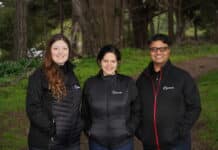>Strange… because we’ve captured the story of DeepRoot Linux, which speaks otherwise.
He is a developer like you, loves GNU/Linux, but his passion didn’t stop there. He decided to work full-time on free and open source software. He scouted around for like-minded people and translated their combined passion into developing products and services around open source. Meet Abhas Abhinav, who, in August 2000, founded DeepRoot Linux, a Bangalore-based GNU/Linux free software business, to quench his passion to work on free and open source software (FOSS) and to develop an entire ecosystem of products, solutions and support around FOSS.
“When we were about to start, although a whole ecosystem of open source software was available, good software alone didn’t result in people adopting FOSS in their daily lives. We saw a gap between existing great software and people being able to use it. There was a need for products, solutions and support around FOSS, for people to adopt it. This need became the purpose of DeepRoot’s existence,” says Abhas. With a small team of three employees, Abhas started DeepRoot right after his graduation, as he already had some part-time experience in consulting for ISPs and Web service providers.
Taking off
Initially, DeepRoot Linux focused on providing network-attached storage solutions that were approximately 25 times cheaper than its competitors. Later, they shifted focus to DeepOfix, DeepRoot’s office server product, which was shipped along with the hardware and fulfilled office requirements.
Stormy weather
Like any other start-up, DeepRoot Linux too faced a lot of initial turbulence. There were problems in getting funds for product development, in forming the team, and in striking the first few deals.
Financial hiccups: A story of wrong priorities
Initially, DeepRoot Linux had poor sales and cash flows, too, weren’t positive. The firm had no venture capital funding. Further, the team made the mistake of focusing on product development over services around Linux. Product development demanded more funds and time; besides, the product was dependant on support services for its success. This added to the firm’s financial woes, as costs incurred were high with little or no returns. “We spent a lot of time and money developing our products, but didn’t spend enough time developing the services around Linux essential for returns from the products we developed,” says Abhas, with regret.
Team building. An early hurdle
Apart from financial obstacles, DeepRoot had other problems. “Developing a team of product developers was a challenge, as very few had the vision to develop products, nor could they dedicate themselves full-time towards developing FOSS solutions,” says Abhas.
Clear skies at last
The early bumpy rides of the company became smooth after it struck a few deals. The flexibility possible due to a young and fresh team, with radical marketing strategies, helped the team win orders. “Striking our first deal was a challenge and we got it by participating in the IT.Com Convention. Though we didn’t have a product to showcase, we set up a stall and distributed brochures of DeepRoot. This participation got us attention and also our first few orders for developing products, services and localisation. In 2001, we again took part in the convention and continued such marketing activities to let people know about us, our solutions and services. This helped us build our business in the initial stages,” Abhas recalls.
Meanwhile, the inexperience of the team seemed to be a boon rather than a bane for DeepRoot. The young team members were more flexible, displaying tremendous fervour to sell products. “The lack of experience resulted in no preconceived notions about the client’s acceptance of a new solution provider. We placed no limitations on what we could or ought to do. This openness helped us keep up the enthusiasm when trying to sell, ultimately resulting in closing deals.”
The first handshakes
DeepRoot’s first client was an ISP in Hyderabad run by a seasoned businessman. “Back then, we developed server appliances that had to be plugged in to run the systems. We integrated LCD modules in it like the ones you see in PCO machines with keypads, etc. This caught the eye of the Hyderabad-based company, which wanted the same for their products. We built the entire software and hardware for their product. Alongside, we released the software developed as FOSS,” says Abhas.
The first services client was a company specialising in developing embedded software, called software for ‘controller area network’ (CANs), for cars. “The firm used Linux in its office. We provided file services, domain authentication, BNP, e-mail, a firewall, and proxy services,” reports Abhas.
Lessons learnt
During the initial phases, DeepRoot learnt that selling FOSS solutions by talking of Linux alone wouldn’t work as a business strategy. People needed holistic workable solutions around GNU/Linux. “We realised that the only way to sell Linux was by selling a complete Linux package—products addressing the customer’s concern with readily available services and support,” said Abhas. DeepRoot used hardware resellers, systems integrators and distribution chains to push this complete package.
DeepRoot today
Fast forwarding to the present, DeepRoot has come a long way from its infancy. It has developed a revenue-generating business model and offers a range of solutions and services around Linux, catering to multiple sectors, namely education, aerospace, healthcare, insurance, manufacturing, cement, iron and steel, garment exports, non-profit organisations, newspapers/publications, software services, semiconductors, government and defence, BPO, financial services, Web hosting, ISP and retail.
The solutions the company provides include distributed e-mail, unified authentication, thin client solutions, directory services, link management, file serving and storage solutions, request tracking and helpdesks, firewalls and VPNs, mail server clusters, proxy servers, etc. The solutions are built on the deepofix mail server and powered by Debian GNU/Linux. DeepRoot’s Web-based software uses the Perl and Catalyst Web framework while the systems software is a mix of C, Perl and Bash.
Sound business strategy
DeepRoot has a strong business model based on charging for the services it provides. “If anything goes wrong with your free software, we’ll fix it, regardless of whether we developed it or not—but for a price. The revenue generated by selling our services around Linux has made us profitable for the last four years. Today, we have around 400 such regular customers,” says Abhas.
To successfully implement this business strategy and ensure that awareness translates into adoption, the company focuses on marketing and strong advocacy. “We now have a dedicated team for sales and marketing. We also actively advocate FOSS via content, campaigns, etc, because awareness alone will transform this sellers’ market into a buyers’ market.”
The hurdles
Though DeepRoot has been able to arrive at a profitable business model, timely payments from clients and procuring funding from banks for future projects still remain a challenge.
Nevertheless, DeepRoot has overcome its initial challenge of developing a team. “Today, we no longer have a talent crunch as we have found developers committed to working on free software,” says Abhas, who will again be on the hunt for talent when DeepRoot expands its business.
DeepRoot—the route to promising careers
DeepRoot Linux provides long-term and full-time careers to developers, and believes that such software businesses offer promising career opportunities. But what skillsets do they look for? “Knowledge and a long-term commitment to free software is all that is needed to pursue a full-time career in free software,” says Abhas.
Advising developers looking for a full-time career in free software, Abhas suggests two options: “Many companies do use free software in their products without announcing it. Such companies can be a gateway to free software job opportunities for developers. Further, companies still unaware of the potential of FOSS can also provide a challenging and long-term opportunity for free software developers. They can become the agents for change—to go beyond just preaching the values of FOSS and come up with actual free software solutions for enabling the business.” Whatever the route to a career in free software, Abhas believes one has to remain committed to FOSS and embrace more people into the FOSS community.
FOSS business opportunities abound
DeepRoot has shown the business opportunities that free software offers for an entrepreneur. “Because we chose the free software business route, as a business we had a greater ability to take risks and lower experimentation costs. Decision making and addressing problems was also easier and faster as the developer community would come out with solutions that were beyond the reach of the DeepRoot team,” says Abhas, who believes a lot more of the business opportunities around free software still need to be explored by entrepreneurs.
Talking about the business potential of FOSS, he says, “FOSS has tremendous business opportunities as first, many sectors like SMEs cannot afford proprietary software and second, a lot of the software problems in India are very local. They are related to the way we run businesses in India and thus, need locally-developed solutions. We see FOSS solutions and services for the Indian consumer as a hot area for us, or any entrepreneur looking at free software business. If you can address the local problem, you are sure to rise.”
But explore the area with caution, advises Abhas. “Focus on building FOSS products and not Web services because, although the returns are better now, services around FOSS products are more promising in the long run. Second, don’t hold back software. Release it as fast as possible as it is in everyone’s interest—specially in the interest of your business.”
The path ahead
Looking ahead, Abhas says, “Our next line of products will be a direct challenge to software-as-a-service, which locks in the customer. We hope to offer SaaS-like services using FOSS and then deliver them on to local networks.” Alongside, DeepRoot aims to remain committed to solving problems, especially with regard to Indian businesses.












































































[…] This post was Twitted by atulshukla […]
This is the first time i am writing a comment to any ones article ITS VERY VERY IMPRESSIVE A FAN OF OPEN SOURCE